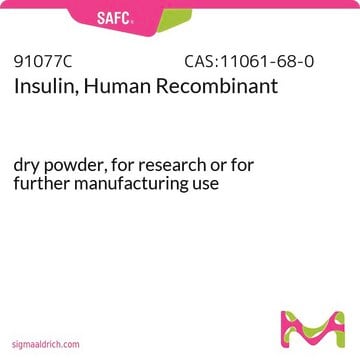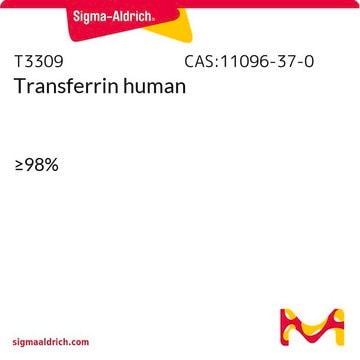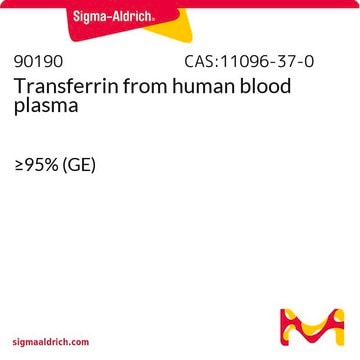T0665
holo-Transferrin human
powder, BioReagent, suitable for cell culture, ≥97%
Synonym(s):
Siderophilin, iron-saturated
About This Item
Recommended Products
biological source
human plasma
description
Iron-saturated
product line
BioReagent
Assay
≥97%
form
powder
technique(s)
cell culture | mammalian: suitable
impurities
HIV, HBsAg and HCV, none detected (tested by FDA approved testing methods)
endotoxin, tested
solubility
H2O: 50 mg/mL
UniProt accession no.
shipped in
ambient
storage temp.
2-8°C
Gene Information
human ... TF(7018)
Looking for similar products? Visit Product Comparison Guide
Application
Biochem/physiol Actions
Preparation Note
Analysis Note
Disclaimer
Storage Class Code
11 - Combustible Solids
WGK
WGK 3
Certificates of Analysis (COA)
Search for Certificates of Analysis (COA) by entering the products Lot/Batch Number. Lot and Batch Numbers can be found on a product’s label following the words ‘Lot’ or ‘Batch’.
Already Own This Product?
Find documentation for the products that you have recently purchased in the Document Library.
Customers Also Viewed
Protocols
Discover our protocol for thawing, plating, and forming hepatocyte spheroids from human spheroid-qualified plateable hepatocytes. Find the formulation for hepatocyte spheroid maintenance media.
Discover our protocol for thawing, plating, and forming hepatocyte spheroids from human spheroid-qualified plateable hepatocytes. Find the formulation for hepatocyte spheroid maintenance media.
Discover our protocol for thawing, plating, and forming hepatocyte spheroids from human spheroid-qualified plateable hepatocytes. Find the formulation for hepatocyte spheroid maintenance media.
Discover our primary human hepatocytes and plating and maintenance media formulations. Explore our protocol for plateable primary hepatocyte cell culture.
Related Content
Explore our protocol for suspension primary hepatocyte cell culture. Discover our primary human hepatocytes and plating and maintenance media formulations.
Explore our protocol for suspension primary hepatocyte cell culture. Discover our primary human hepatocytes and plating and maintenance media formulations.
Our team of scientists has experience in all areas of research including Life Science, Material Science, Chemical Synthesis, Chromatography, Analytical and many others.
Contact Technical Service












